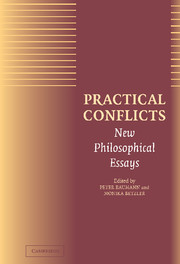Book contents
- Frontmatter
- Contents
- Foreword
- 1 Introduction: Varieties of Practical Conflict and the Scope of Practical Reason
- 2 Willing the Law
- 3 The Myth of Egoism
- 4 Thinking about Conflicts of Desire
- 5 Putting Together Morality and Well-Being
- 6 The Second Worst in Practical Conflict
- 7 Personal Practical Conflicts
- 8 Sources of Practical Conflicts and Reasons for Regret
- 9 Conflicting Values and Conflicting Virtues
- 10 Involvement and Detachment: A Paradox of Practical Reason
- 11 Outcomes of Internal Conflicts in the Sphere of Akrasia and Self-Control
- 12 Are There Insolvable Moral Conflicts?
- 13 Moral Dilemmas of Transitional Justice
- 14 Do Conflicts Make Us Free?
- List of Contributors
- Name Index
- Subject Index
- References
10 - Involvement and Detachment: A Paradox of Practical Reason
Published online by Cambridge University Press: 02 December 2009
- Frontmatter
- Contents
- Foreword
- 1 Introduction: Varieties of Practical Conflict and the Scope of Practical Reason
- 2 Willing the Law
- 3 The Myth of Egoism
- 4 Thinking about Conflicts of Desire
- 5 Putting Together Morality and Well-Being
- 6 The Second Worst in Practical Conflict
- 7 Personal Practical Conflicts
- 8 Sources of Practical Conflicts and Reasons for Regret
- 9 Conflicting Values and Conflicting Virtues
- 10 Involvement and Detachment: A Paradox of Practical Reason
- 11 Outcomes of Internal Conflicts in the Sphere of Akrasia and Self-Control
- 12 Are There Insolvable Moral Conflicts?
- 13 Moral Dilemmas of Transitional Justice
- 14 Do Conflicts Make Us Free?
- List of Contributors
- Name Index
- Subject Index
- References
Summary
If the world were perfect, it wouldn't be.
Yogi BerraI am going to present what I think is an interesting paradox. I will first give an exposition of the paradox (which could be called a “preface paradox for goals” – for reasons that will become obvious soon). I will then deal with some objections and finally discuss a proposed solution to the paradox.
THE PARADOX
A good starting point is, as always, a triviality: Agents want their goals to be realized. More precisely:
(1) If an agent A has a goal G, then A wants that G will be realized (by A or somebody or something else).
This has to be taken in the de dicto-sense – hence not in the de re-sense of “something would constitute the goal's realization, and A wants it.” I use “A wants that p” in the strong sense of “All things considered, A prefers the truth of ‘p’ to the truth of ‘not-p.’”
Having a particular desire is, of course, compatible with not wanting its realization. Goals, however, are different: They imply the desiredness of their realization. It is simply incoherent to say something like, “I have this goal but I do not want to realize it.”
The following thing seems trivial also:
(2) Agents have many goals (at any particular time as well as throughout their lives).
As does this:
(3) If an agent A has a finite number of goals G1, G2, …, Gn, then A wants that G1 will be realized, A wants that G2 will be realized, …, A wants that Gn will be realized.
[…]
- Type
- Chapter
- Information
- Practical ConflictsNew Philosophical Essays, pp. 244 - 261Publisher: Cambridge University PressPrint publication year: 2004
References
- 1
- Cited by



